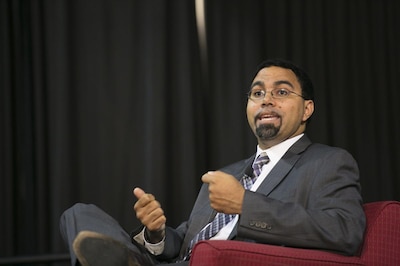A top student at her Nashville high school, Elizabeth Narvaez-Vega recalls observing how other students who struggled the most often had the least experienced teachers, or sometimes were just taught by substitutes.
Her South Nashville school also didn’t have many Advanced Placement courses, and she thought that other schools with fewer poor students had more resources.

Narvaez-Vega was among Tennessee education stakeholders who this week shared concerns about education equity issues with U.S. Secretary of Education John King. They met on Tuesday during an hour-long, closed-door roundtable discussion at a Nashville community center to discuss how the new federal education law, named the Every Student Succeeds Act (ESSA), should be implemented.
The focus was on implications of the new law for students of color such as Narvaez-Vega, a Hispanic student who graduated valedictorian of her 2015 class at Glencliff High School. She is now studying education and social work at Belmont University.
The meeting was with members the Tennessee Educational Equity Coalition, which is helping to advise the State Department of Education on implementing the ESSA in Tennessee. King was in Nashville to give a keynote speech on discipline at a national charter school convention held by the National Alliance for Public Charter Schools.
The education chief’s visit came as the state is seeking feedback on a plan to comply with the new federal law and the U.S. Department of Education is drafting rules related to the ESSA, which was co-sponsored by Sen. Lamar Alexander of Tennessee.
“I felt very comfortable sharing my experience with him,” Narvaez-Vega said minutes after King left Casa Azafran, the center where the coalition’s parent organization, Conexión Américas, is housed.
At the top of the coalition’s agenda was accountability. The group’s mission is to ensure students of color receive high-quality educations, which they can’t do without information.
“We talked about the urgency of making sure kids are getting tested,” said Gini Pupo-Walker, director of education policy for Conéxion Américas.
Unspoken was the lack of information that schools and districts in Tennessee will have this year due to the cancellation this spring of the second part of the state’s end-of-year-tests known as TNReady.
“I think making sure underserved kids, black and brown children, children in poverty — making sure they get what they need are some of the most crucial pieces (of ESSA),” said Gloria Sweetlove, president of Tennessee’s NAACP.
Among other recommendations, the coalition urged King to precisely define subgroups so that states have specific information about student performance. They also urged him to require states to use a small “n-size,” the maximum number of students in a subgroup that a school can have and say that it’s too small to be reported.
The ESSA will grant more flexibility to the state and local levels around assessment and accountability. The coalition and King talked about ways to ensure that the flexibility is not abused, and that schools continue to be accountable for educating all students.
The group also talked about ways to increase the racial and ethnic diversity of Tennessee’s teaching corps.
“I was pleasantly surprised by how consistent everyone was saying that we need … teachers to reflect the community, and not only have more teachers of color but teachers who can speak the languages of our students,” said Tasha Downey, advocacy director for Teacher Town U.S.A., a Memphis-based organization spearheading teacher improvement initiatives in Shelby County.
King talked about ways that the department is trying to reduce the burden of student loans, which in turn might inspire more students of color and from low-income backgrounds to go into teaching, a relatively low-paying profession.
Next up for the coalition is writing to Alexander.
“Starting with, ‘Thank you for writing this incredible law,’” said Pupo-Walker. “Now, we want to help make sure the spirit of it is enforced.”

